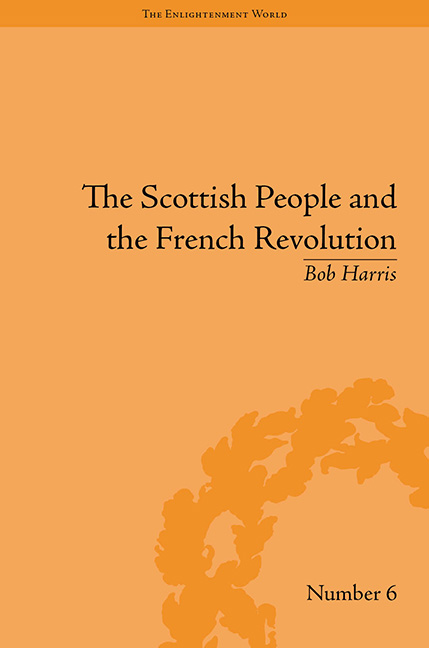Book contents
- Frontmatter
- CONTENTS
- Preface
- Introduction
- 1 The Eighteenth-Century Roots of Scottish ‘Jacobin’ Politics
- 2 Newspapers, the French Revolution and Public Opinion
- 3 ‘The True Spirit of Liberty’: Scottish Radicals, 1792–4
- 4 Checking the Radical Spirit
- 5 Volunteers, the Militia and the United Scotsmen, 1797–8
- 6 Bread, Dearth and Politics, 1795–1801
- Conclusion
- Notes
- Works Cited
- Index
6 - Bread, Dearth and Politics, 1795–1801
- Frontmatter
- CONTENTS
- Preface
- Introduction
- 1 The Eighteenth-Century Roots of Scottish ‘Jacobin’ Politics
- 2 Newspapers, the French Revolution and Public Opinion
- 3 ‘The True Spirit of Liberty’: Scottish Radicals, 1792–4
- 4 Checking the Radical Spirit
- 5 Volunteers, the Militia and the United Scotsmen, 1797–8
- 6 Bread, Dearth and Politics, 1795–1801
- Conclusion
- Notes
- Works Cited
- Index
Summary
From the later 1770s up to 1793, Scotland saw rapid, unexampled economic growth, especially within the textile sector. The picture for the remainder of the 1790s was more mixed. In 1793 and 1797 tight credit conditions precipitated temporary depressions in manufacturing. In the first case, the cause was British entry into the war against revolutionary France and in the second the suspension of cash payments by the banks caused by fears of a French invasion. In 1793, fine linen manufacturing in Glasgow and Paisley and cotton spinning and weaving in and around Glasgow and Paisley and in the south-west were particularly badly hit. In October 1793, a petition from the cotton manufacturers of Glasgow and Paisley claimed that the number employed in the industry had fallen by half since 1792. Visiting Cupar, Fife, in April of that year, an Edinburgh burgess noted in his journal: ‘Money is unusually scarce owing to the late numerous Failures’. Higher than normal prices for provisions were, he also reported, adding to difficulties. In and around Perth, trade seems to have been dull in the early summer. On 3 June, the town's carters petitioned the magistrates for an increase in the rates they were able to charge, arguing that ‘times are so very hard in this and in all other places and so little trade to be had or any employment whatsoever…’. In early August, it was reported from Perth: ‘The manufactures are still very idle especially the Cotton – The Linen are not quite so bad …’. For many sectors and firms, recovery was, nevertheless, fairly rapid, both in 1793 and 1797. Even cotton manufacturing, which had been very adversely affected in 1793, was booming by 1798. Suppliers of war materials flourished. In the summer of 1795, an enquiry about whether a recruiting party should be sent to Dundee elicited the response that the take-up was likely to be poor because manufactures there were buoyant owing to wartime demand for sail cloth and brown linen.
- Type
- Chapter
- Information
- The Scottish People and the French Revolution , pp. 185 - 222Publisher: Pickering & ChattoFirst published in: 2014



